In this article:
Attention-deficit hyperactivity disorder, commonly known as ADHD, is a neurological disorder that affects a lot of people worldwide. It is a chronic condition that results in decreased attention and increased hyperactivity. (1)
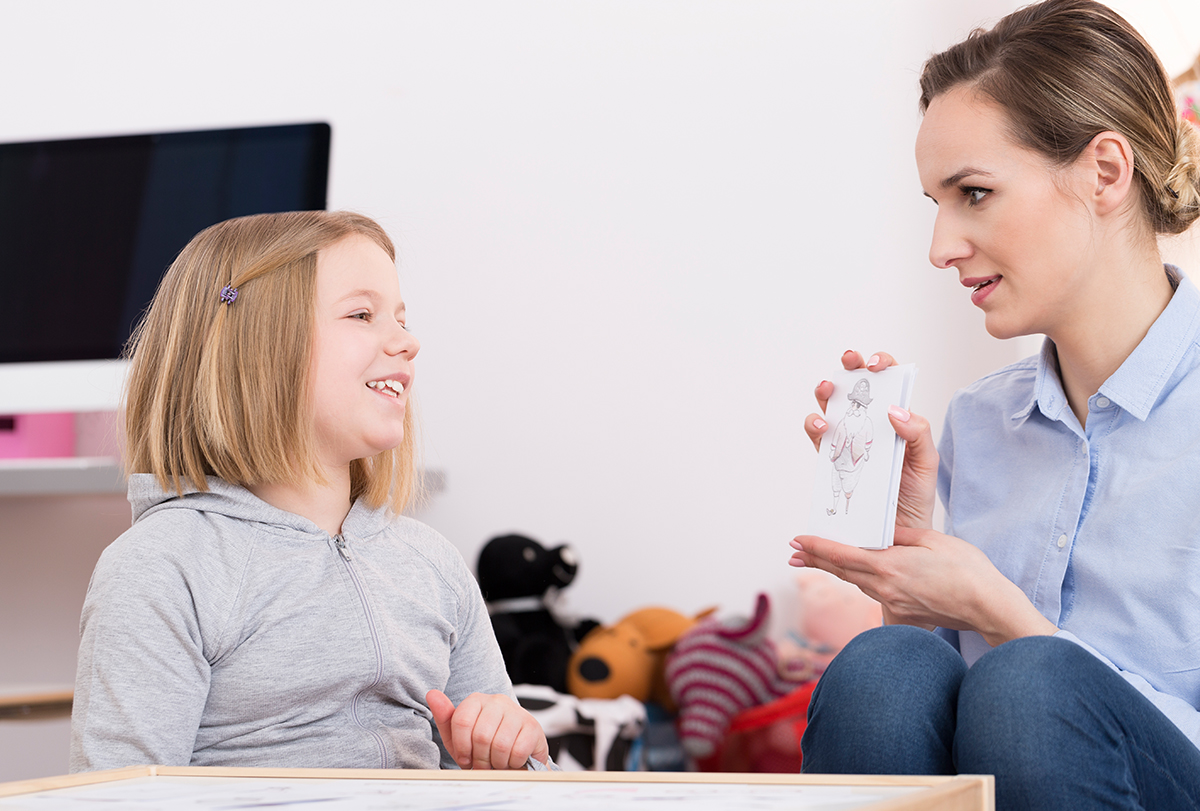
ADHD is a prevalent condition that starts in childhood and can continue into adulthood. Children with ADHD often have difficulty concentrating, are overly active, and are easily distracted. They may also exhibit impulsive behavior.
Fortunately, there are natural remedies that can help manage the symptoms of ADHD and improve the overall well-being of the affected person.
How to Treat ADHD Naturally
Although medication is a very common way of managing ADHD, it is better to take a more natural way of dealing with it as medicines can have a lot of side effects that are not good for children.
In fact, atomoxetine and most medications used for treating ADHD are not recommended for children under the age of 6 years. (2)
You can deal with ADHD naturally through behavioral therapy, lifestyle modifications, and other types of brain training.
Here are some ways of dealing with ADHD naturally.
1. Behavior management
Therapists can help in the management of ADHD or help your child track their ADHD symptoms to lower the impact of the condition.
The therapy includes making sure that the patient has a routine for the day and they become more organized as a person. The coach will teach them how to manage their distractions and set goals plus opportunities for themselves, which they can later realize through behavioral interventions. (3)
a. A behavior management plan
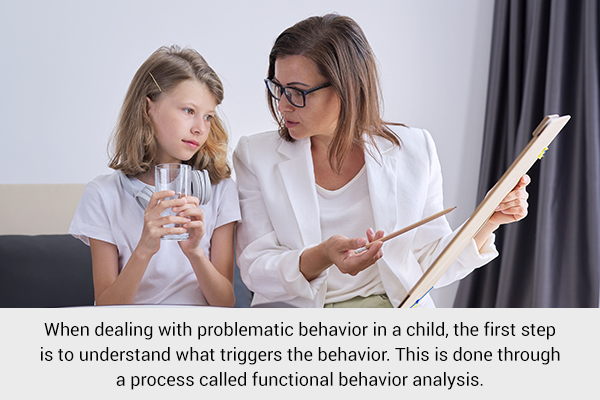
When dealing with problematic behavior in a child, the first step is to understand what triggers the behavior. This is done through a process called functional behavior analysis.
It involves identifying which behaviors need to be encouraged and which ones need to be reduced and then figuring out what environmental factors contribute to these behaviors.
Once this is done, a behavior management plan can be developed to help the child improve their behavior. (3)
b. Cognitive-behavioral therapy
Cognitive-behavioral therapy (CBT) can help the patient deal with the challenges they face, such as negative thought patterns.
This therapy is advised more for adults who suffer from ADHD rather than children. It helps them grow their skill set and effectively deal with ADHD in their day-to-day life. (4)
2. Parent training
Just like there is behavioral therapy for children or patients, there is also behavioral training for their caretakers such as the parents and teachers who help them learn how to interact with those who suffer from ADHD.
This type of training is important for lowering the stress of having a child who suffers from ADHD on the parent or teacher. Someone who suffers from ADHD tends to be very aggressive and noncompliant. Learning how to deal with such behavioral changes is an important task for the caretakers.
This training is good for strengthening the relationship between the child and parents as they try to improve ADHD symptoms. (5)
3. Proper dietary practices
A lot of artificial ingredients are found in food nowadays that include food coloring and a few types of preservatives that are known to cause hyperactivity in kids. These kinds of food should be avoided in order to manage ADHD symptoms.
A few other things to avoid include sodium benzoate and food colorants such as sunset yellow, allora red, and tartrazine. (6)
On the other hand, some things to add to the diet include omega-3 fatty acids, protein, and zinc.
a. Omega-3 fatty acids
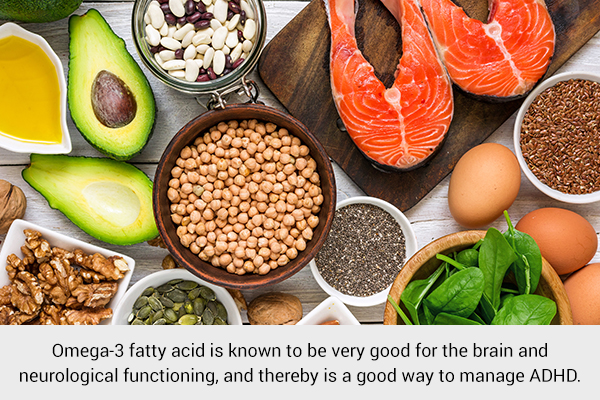
Omega-3 fatty acid supplements are good for ADHD symptoms and hence can be given a try after talking to the doctor about them.
If supplements are not an option, omega-3 fatty acids are also found in fish and other dietary sources including:
- Soybean
- Canola oil
- Mackerel
- Flaxseeds
- Kidney beans
- Chia seeds
- Walnuts
- Spinach
- Salmon
Omega-3 fatty acids are very beneficial for the brain and neurological functioning and, thereby, are a good way to manage ADHD. (7)
b. Protein
A good diet is an important part of managing ADHD symptoms. Studies show that a good amount of protein intake will trigger brain function and neurotransmitters that cause the person to be more alert.
Protein is also known to prevent hyperactivity as it curbs the rise in blood sugar. (8)
c. Zinc and other nutrients
Other than omega-3 fatty acids, a diet rich in iron, zinc, magnesium, vitamin C, and vitamin B6 is also good for regulating brain function when a person suffers from ADHD.
Studies have shown that low levels of zinc can be related to ADHD. However, it is important to note that zinc supplementation should not be started without consulting a doctor first. (9)(10)
Also, remember to do proper planning for meals. It is extremely important that a person who suffers from ADHD has a very healthy and balanced diet as it can help manage the symptoms.
Make sure that your child who is suffering from ADHD eats only fresh ingredients that are not high in sugar or fat. A low-salt or low-sodium diet should be prioritized. Try to cook at home so that you know exactly what your child is eating. (11)
4. Physical activity
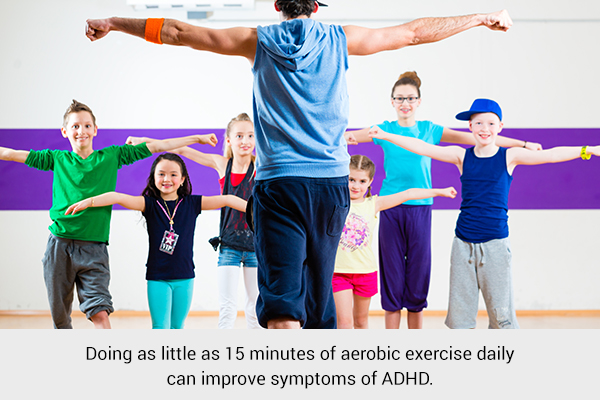
It is proven that exercising regularly is good for the brain. Doing as little as 15 minutes of aerobic exercise daily can improve ADHD symptoms.
To know the proper physical activity for a person with ADHD, talk to their doctor, who can plan an exercise routine for them. (12)
5. Herbal remedies you can try
Here are some herbal remedies for managing ADHD.
a. Ginkgo
Research has shown the effectiveness of Ginkgo biloba as a complementary therapy for ADHD in children and adolescents who were also receiving medicine.
A study found that compared to a placebo, G. biloba (80–120 mg/day for 6 weeks) resulted in greater improvement in inattention and total ADHD scores as rated by parents and teachers.
These findings suggest that G. biloba may be an effective complementary treatment for ADHD, but longer studies are needed to confirm this. (13)
Note:
- Keep track of any changes or improvements in ADHD symptoms while taking ginkgo. It may take several weeks to notice any effects.
- If any side effects or adverse reactions occur, stop the supplement and consult a healthcare professional.
b. Ginseng
According to a study, a combination of omega-3 and Korean red ginseng extract may be helpful in managing ADHD symptoms and cognitive function in children with ADHD.
In the study, 40 children aged 6–12 years with ADHD were given daily supplements containing 3 mg of Korean red ginseng extract. After 12 weeks, significant improvements were observed in ADHD symptoms and cognitive function, including attention, memory, and executive function.
The supplement was well tolerated, and further research may be helpful in determining the use of ginseng in ADHD management. (14)
Note: It is important to consult a healthcare provider before starting any new supplements, including ginseng. They can provide guidance on dosages and potential interactions with other medications. If a healthcare provider recommends taking ginseng for ADHD management, it is typically available in capsule or tablet form.
c. Passionflower
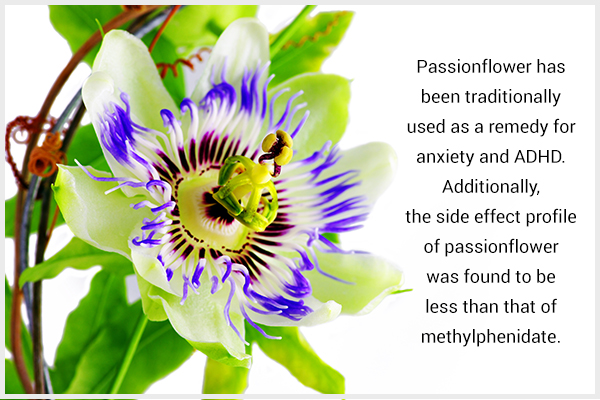
Passionflower has been traditionally used as a remedy for anxiety and ADHD.
Its use has been tested in a randomized trial involving 34 children with ADHD. Results showed that there was no significant difference in clinical benefits between treatment with passionflower and methylphenidate (ADHD medicine) over the course of the 8-week trial.
Additionally, the side effect profile of passionflower was found to be less than that of methylphenidate.
While passionflower may have potential as a treatment for ADHD, further research is needed to confirm its efficacy and safety in a larger population. (15)
6. Meditation and relaxation techniques
Research highlights the potential benefits of mind-body therapies in managing ADHD symptoms.
The fact that these therapies have little to no unwanted side effects and can be practiced at home or school makes them promising methods of managing ADHD.
A study suggested that mindfulness and meditation can help individuals with ADHD learn to control their attention and focus on a specific purpose, which can lead to improved symptoms.
Additionally, involving parents in mind-body training may have added benefits for children’s ADHD symptoms, as parents can learn improved methods of disciplining and responding to their child’s behavior. (16)
7. Good sleep hygiene
Stimulant medications, which are commonly used to treat ADHD, can have adverse effects on sleep, particularly when doses are increased. As a result, individuals with ADHD who take stimulant medications are at increased risk of insomnia and other sleep-related disorders.
Moreover, ADHD itself is associated with dysregulated sleep, which can exacerbate symptoms of the disorder.
In light of these challenges, it is essential that individuals with ADHD practice good sleep hygiene to help regulate their sleep and improve their overall health and well-being.
This can include establishing regular sleep and wake times, avoiding stimulating activities before bedtime, creating a calming sleep environment, and limiting exposure to screens and other electronic devices in the hours leading up to sleep. (17)
What Are the Different Types of ADHD?
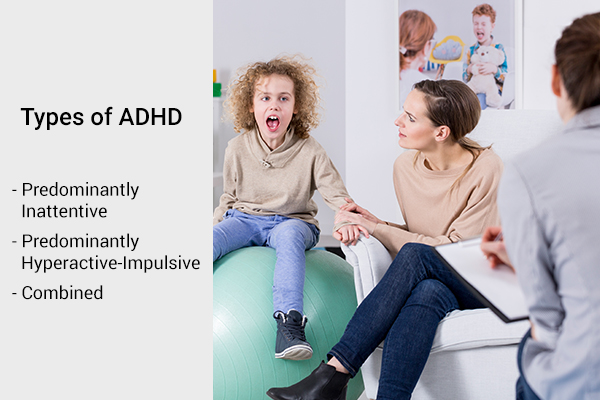
There are three types of ADHD according to the Diagnostic and Statistical Manual of Mental Disorders, Fourth Edition Revision (DSM-IV-TR):
- Predominantly inattentive
- Predominantly hyperactive-impulsive
- Combined
Boys are more likely to have the predominantly hyperactive-impulsive type, which occurs 2 to 9 times more frequently than in girls. The predominantly inattentive type affects both boys and girls equally.
ADHD often runs in families.
What Is the Cause of ADHD?
Scientists are still trying to understand what causes ADHD, but there is no one specific cause that has been identified yet. Several factors could potentially contribute to the development of ADHD, including genetics, brain chemistry, and behavior.
Some things that may increase a person’s risk of developing ADHD include being born with a low birth weight, experiencing head trauma, or exposure to lead, alcohol, tobacco, or cocaine before birth.
Research suggests that people with ADHD may have differences in their brain chemistry, specifically related to the activity levels of certain neurotransmitters such as dopamine and norepinephrine. It’s important to note that only a few children (<5%) with ADHD have signs of neurological damage. (18)
Tips When Dealing With Children With ADHD
Here are some tips for parents of children with ADHD:
- Avoid using negative labels such as “failure” or “lazy” for your child. Instead, use positive affirmations like “you are talented and intelligent.”
- Avoid comparing your child with others, especially in front of others.
- Don’t give your child too many tasks or toys to play with.
- Avoid having your child study near a window, as it can be distracting.
- Seek help from psychiatrists or special teachers for vocational training, instead of forcing your child to complete formal education.
- Remember, your thoughts and words have a powerful impact on your children’s personality. So, try to use positive affirmations and visualization to help your child succeed.
Just like a computer, your mind retains the information you feed it, which can shape your identity and that of your children. Even a mature and hardworking person can be affected by negative affirmations over time, leading to a negative self-image.
So, avoid using negative labels or affirmations for children with ADHD as it can have a detrimental effect on their self-perception and overall personality.
Most-Asked Questions About ADHD
What are the symptoms of ADHD?
ADHD is characterized by three main symptoms: inattention, hyperactivity, and impulsivity.
To be diagnosed with ADHD, these symptoms must be present at home, school, and during clinic visits. A confirmed diagnosis requires that these symptoms have been present for at least 6 months.
It is important to visit a psychiatrist as soon as possible if you suspect that you or your child may have ADHD. (19)
People who suffer from ADHD offer witness the following symptoms: (20)
- Carelessness
- Forgetfulness
- Restlessness
- Inability to pay attention
- Unable to organize things properly
- Fidgeting
- Aggression
- Impulsivity
- Absentmindedness
- Anxiety
- Learning disability
What are the side effects of ADHD medicines in children?
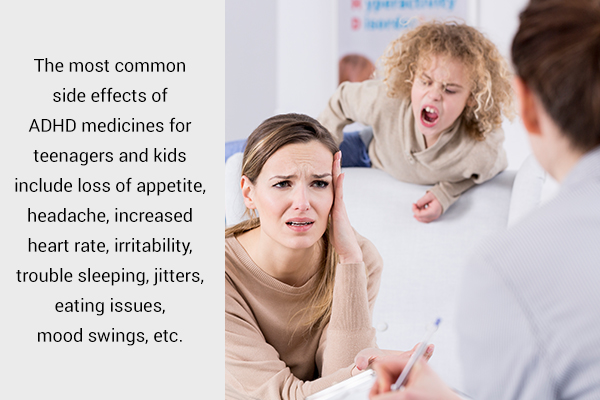
The most common side effects of ADHD medicines for teenagers and kids include: (21)
- Loss of appetite
- Headache
- Increased heart rate
- Irritability
- Trouble sleeping
- Jitters
- Eating issues
- Mood swings
- Increased blood pressure
- Nausea
- Improper weight gain
- Drowsiness
- Gastric issues
What is neurofeedback training for ADHD?
Neurofeedback training is an electroencephalogram (EEG) biofeedback in which the doctor applies sensors to their child’s head that are then connected to a monitor to study the child’s brain wave pattern.
The child is asked to perform a few things, and then their brain waves are studied to see how well they are able to focus on the task. During this training, various types of interventions and strategies can be tried out to see which one affects brain activity in the most positive manner. (22)
Final Word
ADHD is a chronic neurological condition that affects a lot of people worldwide. Although medication is a very common way of managing ADHD, natural remedies can also help manage the symptoms of ADHD and improve the overall well-being of the affected person.
Natural remedies such as behavioral management, cognitive-behavioral therapy, parent training, dietary practices including omega-3 fatty acids, protein intake, zinc, and other nutrients supplementation can be effective in managing ADHD.
Proper planning for meals is also important to ensure that a person who suffers from ADHD has a healthy and balanced diet to help manage the symptoms.
- Was this article helpful?
- YES, THANKS!NOT REALLY


